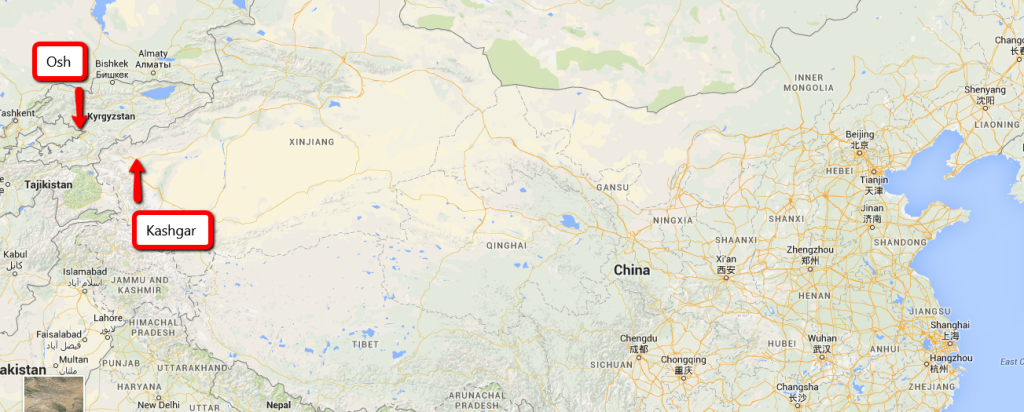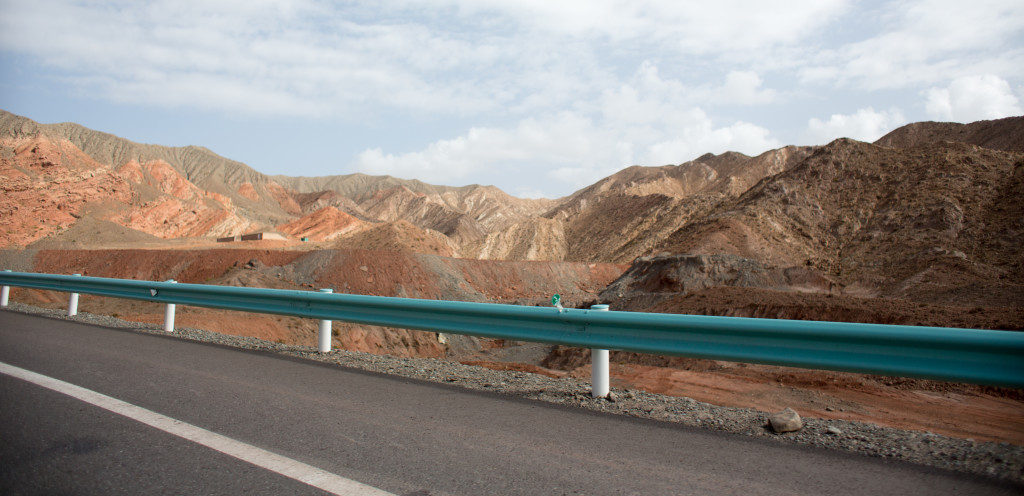 Our journey to leave China began at the crack of dawn, six a.m. Xinjiang, eight a.m. Beijing. We piled out of our hotel quietly, trying not to attract police attention. The streets were deserted. A few taxis petered past us.
Our journey to leave China began at the crack of dawn, six a.m. Xinjiang, eight a.m. Beijing. We piled out of our hotel quietly, trying not to attract police attention. The streets were deserted. A few taxis petered past us.
We waited outside one of the bus stations where shared taxis gathered. The few cabs who had gathered nodded when we told them we wanted to go to Wuqia, the tiny border city nestled between Taklimakan Desert and the Pamir Mountains.
“We can go now, if you want, only one hundred twenty r.m.b.” One of the cab drivers turned to us, saying. Tickets were thirty r.m.b. a person, almost five U.S. Dollars. If we waited for the cab driver to get two more passengers heading to Wuqia, however long that took, the two of us would pay sixty. If we left now, paying one hundred and twenty for the whole car, the driver would make the same amount of money, and get done sooner, meaning he might be able to make an extra trip that day.
I shrugged. I was not interested in paying that much, though, if we had to wait a few hours, it might seem more appealing.
After kicking around for twenty minutes, another driver came over. His car’s interior was tricked out with flags of soccer teams from England’s Premier League, a British Flag kleenex box and swanky red and black upholstery. The car itself ran, not on petroleum, but natural gas.
At first, the Uighur driver, speaking Mandarin, asked us where we were going. I told him Wuqia, and he said he would take us there for one hundred and twenty. I shrugged and pointed towards the other cab drivers. “He gave us the same price. We’re waiting for two more passengers.”
This driver sauntered over to the cabbies. A few minutes later, he pestered us again, saying “I’m going to Wuqia for personal business and I just need someone to offset the costs of getting there. So, we can leave right now, and you’ll only pay one hundred.”
I consulted with Galen and then told him, “We’ll do it for eighty.” I did not mind paying a little extra, since there was no telling when we would get those two other passengers we needed, but I also realized that this guy need us. No matter what, this driver was going to Wuqia. Eventually, he would fold and give us a better price, once he became convinced that he could not squeeze anything more out of us.
The driver stood beside the curb where we sat, kvetching for five or ten minutes, telling me how rich people in my country were. I shrugged and said something how he was not poor, pointing to the expensive decorations inside his car. After waiting a little longer, he dropped his price to ninety, and we agreed.
“Can I use your phone?” the driver suddenly asked as we were heading out of town.
Annoyed with our driver, I quickly thought up a lie. “My phone doesn’t have any money.”
He clicked his teeth sorely, and pulled over beside a row full of small shops. For a few minutes, he disappeared. When he returned, he complained, “None of them are open.” It was almost 6:40, Xinjiang time. Turning to me, he asked, “Do you have any smokes?”
“Nope.” I said.
He sped raced down interstates. Once he shifted from the interstate to a country highway, full of sheep and women totting toddlers along the edge of the road, he slowed down only a little. We raced past them, dangerously close.
In a Uighur village, we made another inexplicable stop, this time for almost ten minutes. He had told us neither where he was going nor how long we were going to wait there, so, after the driver disappeared, I shuffled out of the car and walked around the tiny Uighur village. There was a van there, where folks were piling in to go to Wuqia. I contemplated abandoning the driver and his tricked out car, but he soon returned.
“Still no smokes he said.” The village was bustling; I doubted he could not find cigarettes. Still, I never found out what he was really doing during those ten minutes he disappeared.
Racing through the desert farms, the roadsides planted with trees that blurred past us, the driver suddenly slammed on his brakes in the middle of the highway and turned around. After a few hundred feet of backtracking, he parked and got out, hugging a man waiting on the side of the road. They chatted for a few minutes in Uighur, then the man piled into the car with us.
“This is my brother,” our driver said. “How could I not give my own brother a ride?” he asked rhetorically as I tried to protest that we had paid to get to the border quickly. My protests were of little use. The man piled into the car, and we had to wind through the village for several minutes, just to pick up the ‘brother’s’ cellphone.
That was the last of our inexplicable stops morning. From there, we sped out of the desert farms and into the foothills of the Pamirs. That corner of China has a stark, quiet beauty to it.
We arrived at Wuqia, and, as usual, I was surprised at how large this Chinese backwater was. This was a supposed to be a tiny border town, but there were several six or seven story buildings punching through the skyline.
The driver dropped us off at the entrance to the border post, trying to get us to pay a little extra for something. I told him off, saying he had picked up his ‘brother,’ and we did not owe him anything.
“Next time, I will not pick you up.” The driver threatened as his brother piled into the front seat.
“Great. Next time, I don’t want you to pick me up.” I said, waving him away.
As he drove off, we began to think about what our next step was, but, before we could even make a decision, a small gold cart pulled beside us and whisked us past the entrance to the immigration processing center.

